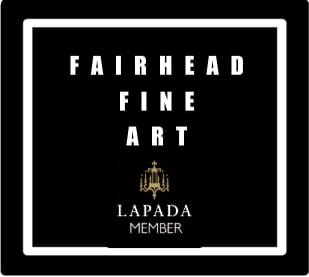Julian Opie (British, b.1958) is a sculptor and digital artist associated with the New British Sculpture movement, and best known for portraits that reduce subjects to essential lines and color planes. Born in Oxford, he studied at Goldsmith’s School of Art from 1979 to 1983, during which time he created the series Eat Dirt, Art History of tongue-in-cheek copies of famous artworks. In his early work, Opie made steel sculptures of domestic appliances, architectural structures and abstract, geometrical shapes. More recently, he has focused on digital media such as LED projections and graphic art. His work draws on classical portraiture, Japanese woodblock prints and Pop Art aesthetics, particularly the work of Andy Warhol and Roy Lichtenstein.
Opie has created a stylized, fragmentary visual language that de-personalizes his subjects, but he includes details, such as an exotic flower in Muliati, Shop Assistant (2002), specific titles, and different colored background to distinguish each work. Opie has produced several continuous animations on LCD screens, such as Christine Blinking (1999) and Suzanne Walking (2002). A number of Opie’s works are displayed in public locations, such as Ann Dancing (2007), a sculpture of four LCD screens which was installed as part of the Indianapolis Cultural Trail. His work is included in several public collections, including the Tate Gallery in London, the National Museum of Art in Osaka, and the Museum of Modern Art in New York. He lives and works in London.
- Home Page
-
Artists' Galleries
- Karel Appel
- Francis Bacon
- Balthus
- Jean-Michel Basquiat
- Joseph Beuys
- George Braque
- Andre Brasilier
- Camille Bryen
- Bernard Buffet
- Jorge Camacho
- Jean-Pierre Cassigneul
- Patrick Caulfield
- Marc Chagall
- Jean Cocteau
- Egidio Costantini
- Robert Couturier
- Salvador Dali
- Kees van Dongen
- Raoul Dufy
- Jean Dufy
- Bob Dylan
- Max Ernst
- Erte
- Foujita
- Terry Frost
- Walter Furlan
- Alberto Giacometti
- Richard Hamilton
- Keith Haring
- Paul-Cesar Helleu
- Patrick Heron
- Damien Hirst
- David Hockney
- Howard Hodgkin
- John Hoyland
- Robert Indiana
- Allen Jones
- Wassily Kandinsky
- Anish Kapoor
- King Charles III
- Jeff Koons
- Le Corbusier
- Fernand Leger
- Roy Lichtenstein
- L S Lowry
- Henri Matisse
- Joan Miro
- Henry Moore
- Pablo Picasso
- John Piper
- Camille Pissarro
- Ludovic Rodo Pissarro
- Serge Poliakoff
- Mel Ramos
- Sophie Ryder
- Niki de Saint Phalle
- Dunoyer de Segonzac
- William Scott
- David John Shrigley
- Francis Newton Souza
- Arpad Szenes
- Rufino Tamayo
- Walasse Ting
- Jacques Villon
- Maurice de Vlaminck
- Andy Warhol
- Tom Wesselmann
- Store
- Artists' Books
-
Biographies
- Karel Appel
- Francis Bacon
- Balthus
- Banksy
- George Baselitz
- Jean-Michel Basquiat
- Edward Bawden
- Joseph Beuys
- Peter Blake
- George Braque
- Andre Brasilier
- Brassai
- Camille Bryen
- Bernard Buffet
- Alexander Calder
- Jorge Camacho
- Robert Capa
- Patrick Caulfield
- Jean-Pierre Cassigneul
- Lynn Chadwick
- Marc Chagall
- Charles III, King of Great Britain
- Jean Cocteau
- Denise Colomb
- Egidio Costantini
- Robert Couturier
- Salvador Dali
- Sonia Delaunay
- Paul Delvaux
- Andre Derain
- Jim Dine
- Robert Doisneau
- Marcel Duchamp
- Raoul Dufy
- Jean Dufy
- Bob Dylan
- Tracey Emin
- Sir Jacob Epstein
- Max Ernst
- Romain de Tirtoff Erte
- Mary Fedden
- Foujita
- Lucian Freud
- Othon Friesz
- Dame Elisabeth Frink
- Sir Terry Frost
- Walter Furlan
- Alberto Giacometti
- Philippe Halsman
- Richard Hamilton
- Keith Haring
- Paul-Cesar Helleu
- Patrick Heron
- Damien Hirst
- David Hockney
- Howard Hodgkin
- Dora Holzhandler
- John Hoyland
- Robert Indiana
- Albert Irvin
- Allen Jones
- Jeff Koons
- Le Corbusier
- Sir Anish Kapoor
- Fernand Leger
- John Lennon
- Roy Lichtenstein
- Robert Longo
- Lawrence Stephen Lowry
- Jean Lurcat
- Rene Magritte
- Andre Masson
- Henri Matisse
- Roberto Matta
- Willy Maywald
- Joan Miro
- Henry Moore
- Ben Nicholson
- Julian Opie
- Jules Pascin
- Victor Pasmore
- Pablo Picasso
- Camille Pissarro
- Clovis Prevost
- Serge Poliakoff
- Mel Ramos
- Man Ray
- Pierre-Auguste Renoir
- Bridget Riley
- Sophie Ryder
- Niki de Saint Phalle
- William Scott
- David Shrigley
- Maria Helena Vieira da Silva
- Francis-Newton Souza
- Arpad Szenes
- Rufino Tamayo
- Dorothea Tanning
- Antoni Tapies
- The Connor Brothers
- Walasse Ting
- Victor Vasarely
- Vladimir Velickovic
- Andre Villers
- Jacques Villon
- Maurice de Vlaminck
- Andy Warhol
- Tom Wesselmann
- Zao Wou Ki
- George Condo
- Print-on-demand Art
- NFT
- Art Blog
- Glossary
- Services
- About Us
- Contact Us
